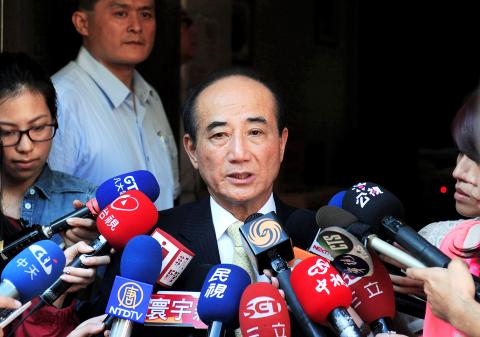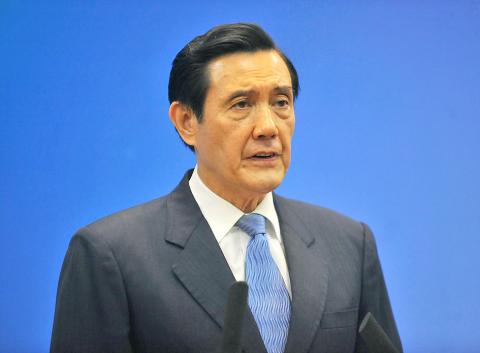At the request of President Ma Ying-jeou (馬英九), the Chinese Nationalist Party (KMT) yesterday revoked Legislative Speaker Wang Jin-pyng’s (王金平) party membership, a move that could strip him of the position he has occupied since 1999, the longest in the nation’s history.
If Wang, a KMT legislator-at-large, fails to reverse the decision through appeals to the party leadership or through other judicial means, his status as a lawmaker will be nullified and he will lose his post as speaker.
The decision was reached by a meeting of the KMT’s Central Evaluation and Discipline Committee.

Photo: CNA
Before the meeting began, Ma delivered a harshly worded statement to the media at 8:30am saying that the influence-peddling case in which Wang is allegedly involved “disqualified” him from being the legislative speaker.
It was the second strongly worded statement about Wang that the president has made since the Supreme Prosecutors’ Office Special Investigation Division (SID) on Friday last week accused Wang of meddling in a breach of trust lawsuit on behalf of Democratic Progressive Party caucus whip Ker Chien-ming (柯建銘) by urging two high-ranking judicial officials to influence a prosecutor into refraining from appealing Ker’s not-guilty verdict.
Huang Chao-yuan (黃昭元), head of the disciplinary committee, said the decision was made after more than two hours of discussion in which it was concluded that Wang “has seriously damaged the party’s image and reputation.”

Photo: Mandy Cheng / AFP
The 15-seat committee was composed of Huang, deputy committee head John Shen (沈榮峰) and 13 other members whose identities were not made public. Four members were absent for various reasons.
Ma, who heads the KMT as chairman, arrived at the party’s headquarters early in the morning and stayed in his office until the committee handed down the ruling at about 11:30am, apparently to see if it would oblige his request that Wang be removed from the party.
As a result, Ma’s 10:15am meeting at the Presidential Office with El Salvadoran Parliament Speaker Sigfrido Reyes was canceled and Reyes was received by Vice President Wu Den-yih (吳敦義) instead.
At the 8:30am press conference, Ma said he has refrained from saying that Wang should resign on his own accord since the SID disclosed the case.
“What I had hoped was that Wang would voluntarily offer to resign as legislative speaker and as KMT legislator-at-large to preserve some dignity for the legislature and the KMT,” Ma said.
Now that Wang has failed to offer to resign, the responsibility to deprive him of his office lay with the KMT, the president said.
“Doing otherwise would be tantamount to acquiescing to judicial dignity being trampled upon,” Ma said.
He again criticized Wang for his “evasiveness” about the “fact” that he “has engaged in influence peddling in Ker’s [case].”
The “hard facts” of Wang’s involvement are obvious, but Wang “didn’t even apologize” for his misconduct, Ma said.
Addressing a meeting of the KMT’s Central Standing Committee in the afternoon, the president applauded the disciplinary committee for making the “right” decision, although it was a “painful” one.
He added that Wang had contributed significantly to the party over the years, “but the [influence-peddling] incident was a chance for the party to wipe away [our] past mistakes and engage in reform, which is the only way to move the party forward and to promote party unity.”
KMT officials who declined to be named said the legislative speaker attended the meeting for just five minutes and told the disciplinary committee that he had neither interfered with a judicial process nor violated the party’s regulations.
After Wang left, Ma was invited to give his position on the matter, a KMT official said, adding that the president had teared up as he talked about his feelings on Wang’s alleged misconduct.
During the discussion, concerns were raised that the membership revocation would be a disadvantage when soliciting votes in southern Taiwan and one attendee questioned Wang’s loyalty to the party, a KMT official said.
A member of the disciplinary committee said he wondered why Wang had reportedly tried to help Ker, but not other party members involved in lawsuits, like Taipei City Councilor Lai Su-ju (賴素如), former Executive Yuan secretary-general Lin Yi-shih (林益世) and Keelung Mayor Chang Tong-rong (張通榮).
Later yesterday, Central Election Commission Vice Chairman Liu I-chou (劉義周) confirmed that the commission had received a message from KMT headquarters voiding Wang’s membership in the afternoon, adding that it forwarded the notice to the Legislative Yuan.
“We received the notice in the afternoon and have forwarded it to the Legislative Yuan,” Liu told the Taipei Times in a telephone interview.
“The Legislative Yuan will now remove Wang as a legislator and notify us in writing once they void his status as a legislator,” Liu said.
“Upon receiving confirmation from the Legislative Yuan, we will formally announce the name of the person who will take over Wang’s seat,” Liu added.
Liu added that, according to the law, Wang would lose his status as a legislator the same day his party membership is rescinded.
Additional reporting by Loa Iok-sin

CHAOS: Iranians took to the streets playing celebratory music after reports of Khamenei’s death on Saturday, while mourners also gathered in Tehran yesterday Iranian Supreme Leader Ayatollah Ali Khamenei was killed in a major attack on Iran launched by Israel and the US, throwing the future of the Islamic republic into doubt and raising the risk of regional instability. Iranian state television and the state-run IRNA news agency announced the 86-year-old’s death early yesterday. US President Donald Trump said it gave Iranians their “greatest chance” to “take back” their country. The announcements came after a joint US and Israeli aerial bombardment that targeted Iranian military and governmental sites. Trump said the “heavy and pinpoint bombing” would continue through the week or as long

TRUST: The KMT said it respected the US’ timing and considerations, and hoped it would continue to honor its commitments to helping Taiwan bolster its defenses and deterrence US President Donald Trump is delaying a multibillion-dollar arms sale to Taiwan to ensure his visit to Beijing is successful, a New York Times report said. The weapons sales package has stalled in the US Department of State, the report said, citing US officials it did not identify. The White House has told agencies not to push forward ahead of Trump’s meeting with Chinese President Xi Jinping (習近平), it said. The two last month held a phone call to discuss trade and geopolitical flashpoints ahead of the summit. Xi raised the Taiwan issue and urged the US to handle arms sales to

State-run CPC Corp, Taiwan (CPC, 台灣中油) yesterday said that it had confirmed on Saturday night with its liquefied natural gas (LNG) and crude oil suppliers that shipments are proceeding as scheduled and that domestic supplies remain unaffected. The CPC yesterday announced the gasoline and diesel prices will rise by NT$0.2 and NT$0.4 per liter, respectively, starting Monday, citing Middle East tensions and blizzards in the eastern United States. CPC also iterated it has been reducing the proportion of crude oil imports from the Middle East and diversifying its supply sources in the past few years in response to geopolitical risks, expanding

Pro-democracy media tycoon Jimmy Lai’s (黎智英) fraud conviction and prison sentence were yesterday overturned by a Hong Kong court, in a surprise legal decision that comes soon after Lai was jailed for 20 years on a separate national security charge. Judges Jeremy Poon (潘兆初), Anthea Pang (彭寶琴) and Derek Pang (彭偉昌) said in the judgement that they allowed the appeal from Lai, and another defendant in the case, to proceed, as a lower court judge had “erred.” “The Court of Appeal gave them leave to appeal against their conviction, allowed their appeals, quashed the convictions and set aside the sentences,” the judges